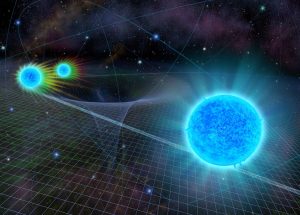Standard definition of gravity: Gravity is the force of attraction that makes things fall straight down.” For centuries, we lived by this idea and belief of what gravity is. That was the Newtonian version and while it made sense back then, it is also wrong.
Albert Einstein created a new definition of gravity. His theory was that each object “curves the fabric of space and time around them.” Imagine being in the middle of a trampoline and you’re the largest person there. Around you are children on that same trampoline. Notice how they tend to moves closer to you while also affecting those around them.
Scientists recently was able to prove Einstein right and Newton wrong by looking at what happens when light from S0-2 (also known as S2 is a star in the center of the Milky Way Galaxy) passed a super massive black hole known as Sagittarius A* (four million times more massive than our sun and located in the Constellation Sagittarius at the center of the Milky Way Galaxy). The gravitational event that occurred exactly as Einstein said it would. They looked at the color from the star, which glowed blue. Had the light did as Newton said, the star would have stayed blue. If the light did as Einstein predicted, the star would have changed to red. The star had a gravitational redshift, just like Einstein said it would.
Astrophysicists and astronomers are now seeking to find another definition of gravity. Like any scientist, it is about challenging the prevailing beliefs and theories.
Like the Newton’s Theory of Gravity, many people have a hard time changing their fast-held beliefs. Beliefs are not set in stone, yet most people believe they are. That keeps those people stuck with a fixed mindset.
Over time, people will become blind to new facts (also known as “the ostrich effect”), including the truth about themselves as well as others. That is a reason why we see many older people “stuck in their ways.” It’s easier to do so versus challenging closely held beliefs. This is especially true if they stay in the same communities, they grew up in.
I would ask you to start tearing apart the beliefs you hold so dearly. Test them based on factual evidence, not on ideology or what others (and yourself) say. In order to do so, you have to open yourself up and accept “what if what I believed was wrong?” It’s scary.
When you find evidence that what you believed your whole life was wrong, don’t knock yourself down and instead, embrace the fact that your understanding regarding life grew. This is an essence of having a growth mindset.
One way to start challenging your beliefs is to imagine what you believe is a table with four legs. Each time you try disprove a belief and you have evidence to support your hypothesis, then take away one of the legs. Eventually you have be able to tear apart your strongly help belief, especially those that are disempowering. The goal is to bring in beliefs that are more empowering.
In my programs, I use this method and others to help build my clients so their beliefs are shifted to ones that more supportive towards a higher version of themselves, a new self-image.
Give the above a go and start your journey towards a more powerful belief system.
Enroll in my FREE “7-Day Empower Your Life eCourse“
https://mindhackacademy.tv/p/7-day-empower-your-life-ecourse
References:
Abuter, R., et. al. (2018) Detection of the gravitational redshift in the orbit of the star S2 near the Galactic center massive black hole. Astronomy & Astrophysics (volume 615, L15) retrieved from https://doi.org/10.1051/0004-6361/201833718 on August 6, 2019
Michelle Starr, June 26, 2018, “BREAKING: Einstein’s Theory of Relativity Just Survived an Insane Test” Science Alert retrieved from https://www.sciencealert.com/star-s2-orbiting-sagittarius-a-supermassive-black-hole-proves-einstein-relativity-first-direct-observation/amp on August 6, 2019

